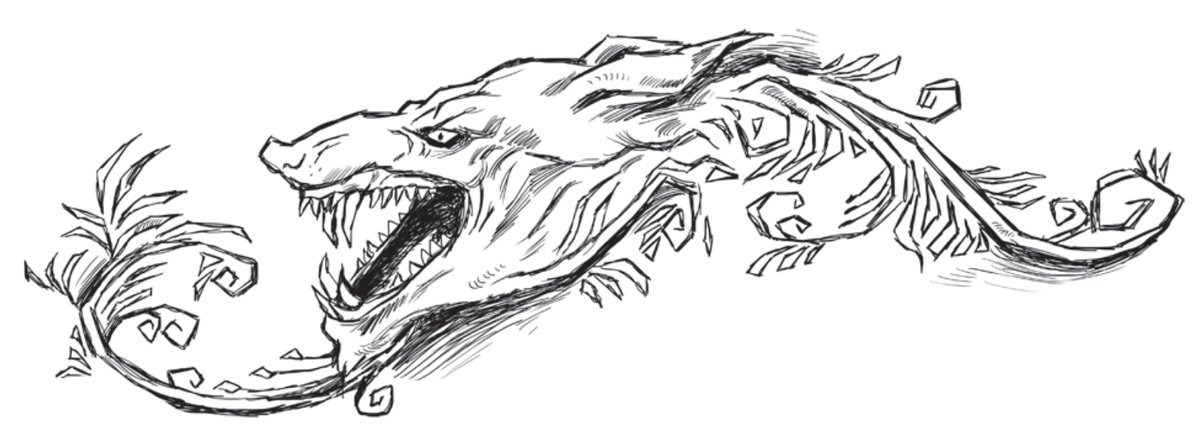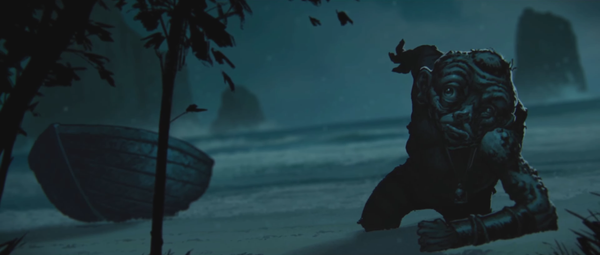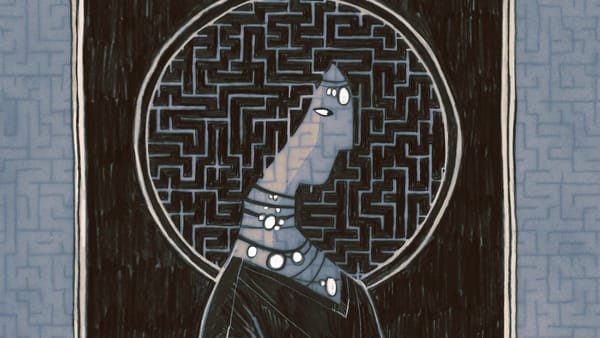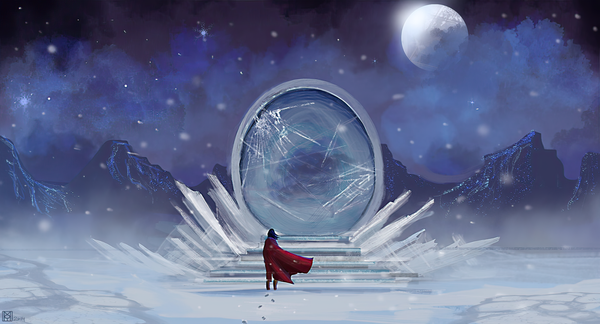Nietzschean Witchers: Beyond Master and Slave Morality in Crossroad of Ravens
'The vast majority of people who claim that rape and violence are disgusting and morally unacceptable to them are simply unable to use violence.' But what of witchers: created as tools of violence by the powerful, yet cast out by society? Slaves and masters at once, as per Nietzsche.

Contents
The vast majority of people who claim that rape and violence are disgusting and morally unacceptable to them are simply unable to use violence, even in self-defense, in defense of their loved ones - or when necessary. This is called: making a virtue out of weakness.
– Vysogota of Corvo, Crossroad of Ravens
How very Nietzschean of you, Pan Andrze…khm, Vysogota of Corvo. In the chapter that follows, young Geralt kills the wizard Artamon of Asguth—both pre-emptively and in retribution. Crossroad of Ravens is the beginning of Geralt’s story of arriving at himself[1], so let’s examine this preface.
The underlying assertions can be broken down into key claims:
- Most people’s moral objections to violence and rape are not genuine moral positions.
- Their morality is a psychological defence mechanism; a post-hoc rationalization.
- Powerlessness—inability to engage in violence effectively—is being reframed as moral superiority.
- True morality requires the capacity for action.
The preface seems to speak to Friedrich Nietzsche’s concept of ‘slave morality’—the idea that the powerless (‘the slaves’, ‘the masses’, ‘the herd’) create moral systems that valorize their own condition, while resentfully condemning the behaviour and traits of the powerful. Their actions are fundamentally reactions. The powerful (‘the noble’, ‘the aristocrats’, ‘the strong’), meanwhile, act and define Good according to themselves, embracing their capacity for violence when needing to ‘dominate’[2] or control others to achieve their ends, affirming their own self in their expressions of power—exhibiting ‘master morality’. Masters create morality, slaves respond to it.
Moral systems that the weak construct and live by are, essentially, for coping with their lot. Master morality originates in sentiment, slave morality in ressentiment, which in Nietzsche’s writings always has associations with revenge and with the inferior position of the person harbouring it. By making a virtue out of weakness, slave morality foregoes admitting that their weakness was in the beginning forced upon them by a master.
Crucially, both moralities are expressions of will to power in different forms. The master-slave axis is describing the nature of people’s moral deliberation when trying to ‘get what they want.’ Even the seeming rejection of power in slave morality is itself a power play—what Nietzsche calls ‘the tyranny of the weak’. ‘Slave morality’ emerges from a position of weakness, but its expression manifests the slaves’ particular will to power. They push for a metaphysical interpretation of the world that puts them in a position of power over life, and gives them means of becoming according to their nature, while making masters alike them as well.
Before seeing how young Geralt slots into this, let’s examine the quote again.
Critiquing the Quote
The vast majority of people who claim that rape and violence are disgusting and morally unacceptable to them are simply unable to use violence… in defense… when necessary.
This statement has several limitations:
- It conflates, and ignores that there’s a difference between capability for defensive violence and inclination toward predatory violence.
- It commits a genetic fallacy by suggesting that the origin of a moral belief (the alleged “weakness”) invalidates its legitimacy.
- We could argue that moral revulsion toward rape and excessive violence served evolutionary functions in building cooperative societies. Hence these moral intuitions would not be merely rationalizations but adaptive traits, and legitimate.
- It overlooks moral rejection of violence independent of capability.
- Many capable of violence choose to reject it on genuine moral grounds.
- Those who cannot fight back might still never choose violence even if they could.
- It doesn’t address whether moral beliefs can be genuine even if untested.
Furthermore, if all violence is seen as equivalent[3] then the stance, despite seeming critical of the status quo, can:
- Serve the powerful by suggesting that everyone would abuse power if they had it.
- Falsely equate the inability to be violent with the choice of not harming others (i.e. everyone’s a predator in disguise).
- Diminish genuine moral choice.
The preface seems aimed at those who conflate all forms of force as equally wrong at all times, thus making themselves morally and practically defenceless against predators. It also alludes to the hypocrisy of servility; survival instinct necessitates self-defence.[4] Therefore, I would argue it critiques self-deception (key to ressentiment), which doesn’t facilitate growth.
Systemic Critique
In Sapkowskian society, there are no fair judges nor honest bankers.[5] Insofar as the Witcher follows the experiences of the marginalized, we never really see functional institutions or effective, just governance that lives up to its ideals. The self-satisfaction of the powerful with their deeds and ends is never portrayed as anything but suspicious at best and hypocritical, if not downright malicious, more often.
What appears as bias toward the marginalized perspective reflects a Nietzschean truth: while true masters reshape reality itself, almost no one achieves this level of will to power. We—the readers—find ourselves among everyone else: we cannot transcend the position of the herd. As Geralt, how we deliberate is set: we cannot help but interpret everything in terms of moral judgment, as almost everyone in the game of will to power. Because what are we supposed to do if we are not Jesus?
Fulko Artevelde cannot sound credible to someone like Geralt, because scapegoating is the standard result of the daily vilification Geralt experiences. Unsurprisingly, he deems institutional violence and corruption worse than individual criminality because the former corrupts the entire system meant to protect people. Incidentally, Fulko’s and Geralt’s exchange illuminates the system: institutions are another arena where morality expresses itself, and pure expression of either morality is unlikely (if not impossible).
At face value, Fulko’s zeal is about guaranteeing public safety: protect the weak! serve a higher cause than power! Markers of slave morality? Geralt, however, tears at this ‘protection’ as enabling abuse of power. He judges Law for morphing into a mere tool of domination and reveals the hypocrisy in claiming to protect while actually oppressing. This could be read as slave morality, or a clear-eyed exposure of how power actually operates—behind moral masks.
When society asserts its will through institutional displays of force, it cloaks the need for such force in terms of ‘slave morality’: appealing to order, justice, social good, general welfare. Appeals to its own power is not very good optics, after all. Then, when the marginal element does stand up for themselves, violating social values they themselves hold dear as safeguards against the abuse of power, it will seem like they are breaking the social contract.[6] The institution has positioned itself as the defender of those values, despite actually being operated by people with master morality principles. Hence, if the weak gain power by corrupting the strong into engaging in moral judgements and coming to believe their actions are evil, then the strong respond with entrapment in kind. The marginalized who suddenly refuse to “turn the other cheek” are violating their own moral inclinations.
This, by and large, is what happens with Geralt, or any other vigilante, when they decide to take justice into their own hands.
Vysogota's cynicism then, exposes how slave morality itself becomes a tool of control: the very moral framework created by the weak to cope with powerlessness becomes weaponized by institutions to maintain their monopoly on violence. The system doesn't just condemn individual acts of resistance - it manipulates the moral instincts of the oppressed against themselves. When witchers or women consider violent self-defense, they must first overcome not just physical constraints but their own internalized moral frameworks that have been twisted to serve power. The 'weakness' Vysogota identifies isn't just an individual's inability to act—it's how moral values themselves become chains for the oppressed.
Between Master and Slave
In Crossroad of Ravens, until the critical shift at the very end, Geralt moves through the mentality of slave-morality which he inherits by belonging to the witcher caste. It’s part of his arriving at himself.
Despite his transhuman nature, Geralt:
- struggles with his ‘defective’ nature because he doesn’t match an external ideal of the ‘perfect, emotionless witcher’;
- defines his actions in terms of what he ‘should’ do rather than what he wants to do; questioning the right of the powerful to dominate;
- empathises with the oppressed and continues to see himself as an outcast; accepting his lower social status despite physical capability;
- values protection of weakness as the protection of Good.
In Nietzschean terms, Good is synonymous with ‘nobility’. ‘The noble type of man experiences itself as determining values; it does not need approval; it judges, “what is harmful to me is harmful in itself”; it knows itself to be that which first accords honour to things; it is value-creating.’ In judging according to his conscience and acting directly upon those judgments, Geralt actually embodies this sense of nobility - yet his social position ensures he will be punished for precisely these noble traits.
Consider the parallel with a wizard:
‘...evidence,’ Artamon said.
[…]
‘I know who murdered Sergeant Margulies and the others. And I will not wait for the law to finally wake up. I will take matters in to my own hands.’
Artamon—one of the elite—behaves, in principle, just as Holt does, just as Geralt does upon encountering the rapist or learning of threats to his companions. All three men judge and act directly, taking matters into their own hands rather than waiting for external authority. The will to act—this noble trait—differs not at all between them. What differs are the consequences: Artamon is likely to face no legal repercussions. The system is made by and for the likes of him. For Geralt, exercising the same impulse leads to the gallows; pushing him toward the very ressentiment characteristic of slave morality.
The legitimacy of the governing bodies’ sole claim to the monopoly of violence rests in their wielding that violence impartially in service of social order (some form of relatively stable equilibrium). According to its social contract with us, we don’t randomly retaliate with (dis)proportionate violence to violations of various degrees by individuals and the law/state ensures we are not unduly violated. Should marginalized groups exercise defensive violence—by becoming vigilantes, for example—the system must punish them in order to avoid precedents of power residing elsewhere. Someone who takes matters into their own hands—according to their own arbitrary morals—sets themselves up as a challenger to power.
The question becomes more pressing when:
- the challenger is a persona non grata;
- the system is corrupt.
‘Holt is a rat. And he deserves a rat's death.’
Witchers, by their nature, complicate the matter. A witcher possesses what Nietzsche would call ‘master’ traits:
- Physical power
- Willingness to act
- Individual moral judgement
- Initiative for direct action rather than appeal to higher authority
Socially, however, witchers are positioned as the oppressed outcasts. They have the physical capabilities of a ‘master’ but the social position of a ‘slave’. Especially in relation to wizards; originally created by them specifically as tools of violence for the powerful. Instead, witchers became a social welfare project. Consequently, they face social persecution for exercising their capacity for violence outside prescribed boundaries—specifically, for exercising their ‘master traits’ against ‘masters’.
Were a witcher in the service of a king, the king’s protection would make their acts of violence fall under different rules of legitimacy. They’d be an extension of the upper class instead of being a dangerously more capable extension of the lower class. Witchers, therefore, possess all physical/kinetic power but lack all social/potential power—the range of moral choices they can practically make is constrained by the “belonging” of their instrumental value.[7]
Beyond Master and Slave
When Geralt kills Artamon, he acts from multiple motives: preventing harm to his companions, self-defence against promised visisection, and vengeance for Monstrum. At some point, he must realize that the line between justified protective violence and something else is ephemeral, and that he—a feeling witcher—is as capable of rationalizing violence as his opponents.
Young Geralt intuitively wishes to wield power in service of the powerless. Under Holt, he learns to make a virtue out of strategic submission, as the powerful do when they pretend to play by the rules of ‘slave morality’. He moves from naive use of power to making conscious choices about how to wield it, and when. When he finally rejects dominance from a position of strength, it comes from choice rather than necessity—he could ‘pull a Holt’ and pursue vengeance but chooses not to. Instead of continuing to react as a slave would, he consciously identifies with the oppressed while determining what is Good in his eyes inherently.
The way beyond the bind that neither succumbs to pure power nor remains trapped in moral judgement comes by way of actions born of love. When Geralt acts out of care, he transcends both master and slave moralities. Love, being its own cause and motive, offers a path to authentic expression of will to power that doesn’t depend on either domination or moral frameworks. This is where Geralt arrives at himself, simply being as he believes best.
In this way, young Geralt’s journey challenges Vysogota’s cynicism by demonstrating that moral choices about violence aren’t always about ability or inability, but about purpose and consequence. Developing his own warrior monk moral agency, he learns a hard lesson: what is good for the soul (pacifism) is not necessarily what the society sometimes needs, and what the society (force) sometimes needs is not necessarily good for the soul.
Footnotes
…if one's metaphysical interpretation is of self-overcoming, how can one overcome that? Or maybe one simply arrives. ↩︎
By ‘domination’ is meant something like: a genuinely powerful person will not encounter resistance (or it won’t matter). The strong get their way against the odds (e.g. Jesus got killed, still won). ↩︎
If there is a difference between defensive and predatory violence, which violence, by how much, is justified, and when? When does defensive violence—ensuring another person cannot continue harming us—become excessive? What would restrain predatory violence pre-emptively? Plenty of empirical questions. ↩︎
An aspiring autocrat could herein pivot into theorizing about levels of sustainable oppression. Thankfully, Ashby’s law gets most human despots. ↩︎
If the banking cartel was not controlled by the dwarves that is; and even then... ↩︎
It’s why Gandhi’s non-violent resistance is extraordinary for a Nietzschean. ↩︎
How, then, does ‘slave morality’ manifest in complex power structures? When the physically powerful are socially oppressed, do they develop different moral frameworks than those who are both physically and socially weak? Do the physically powerful strive to become socially powerful and are a) co-opted by the status quo, b) defeat the powerful and become the new oppressors? Is there a difference between: making a virtue of weakness (slave morality); strategically choosing when to use strength (practical wisdom); using strength in service of the weak (vigilante path)? ↩︎




